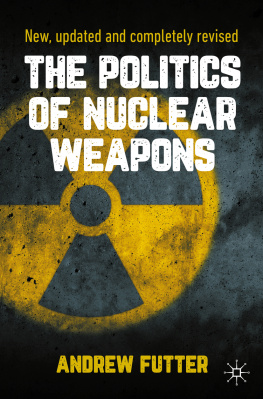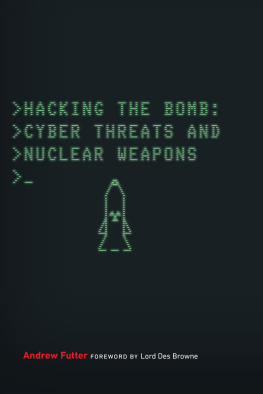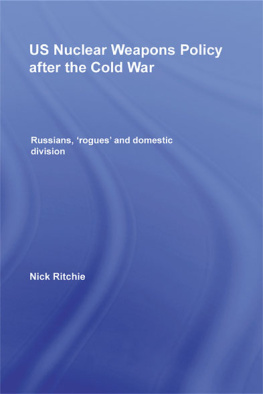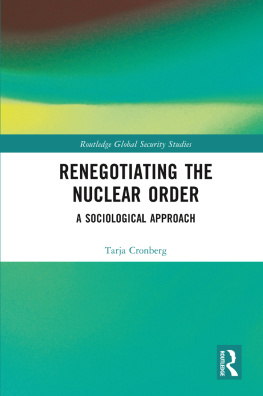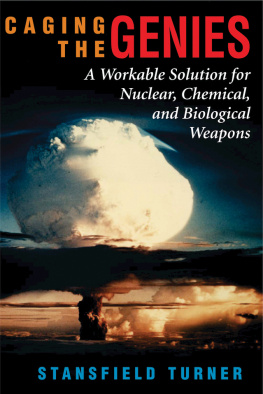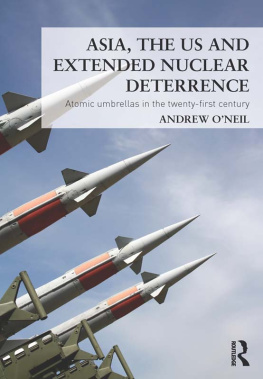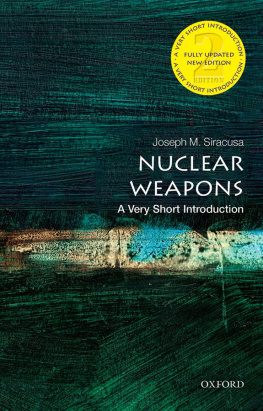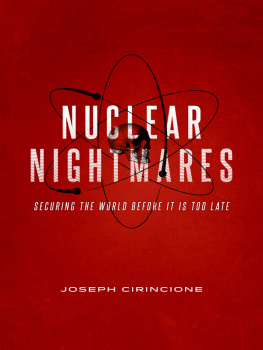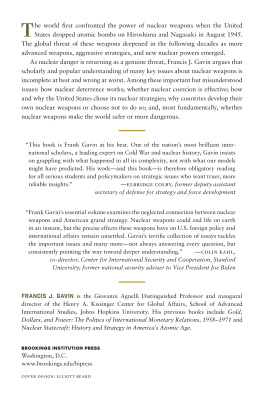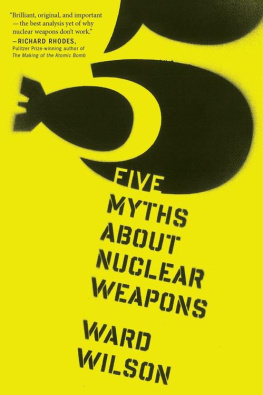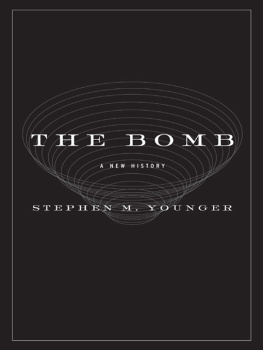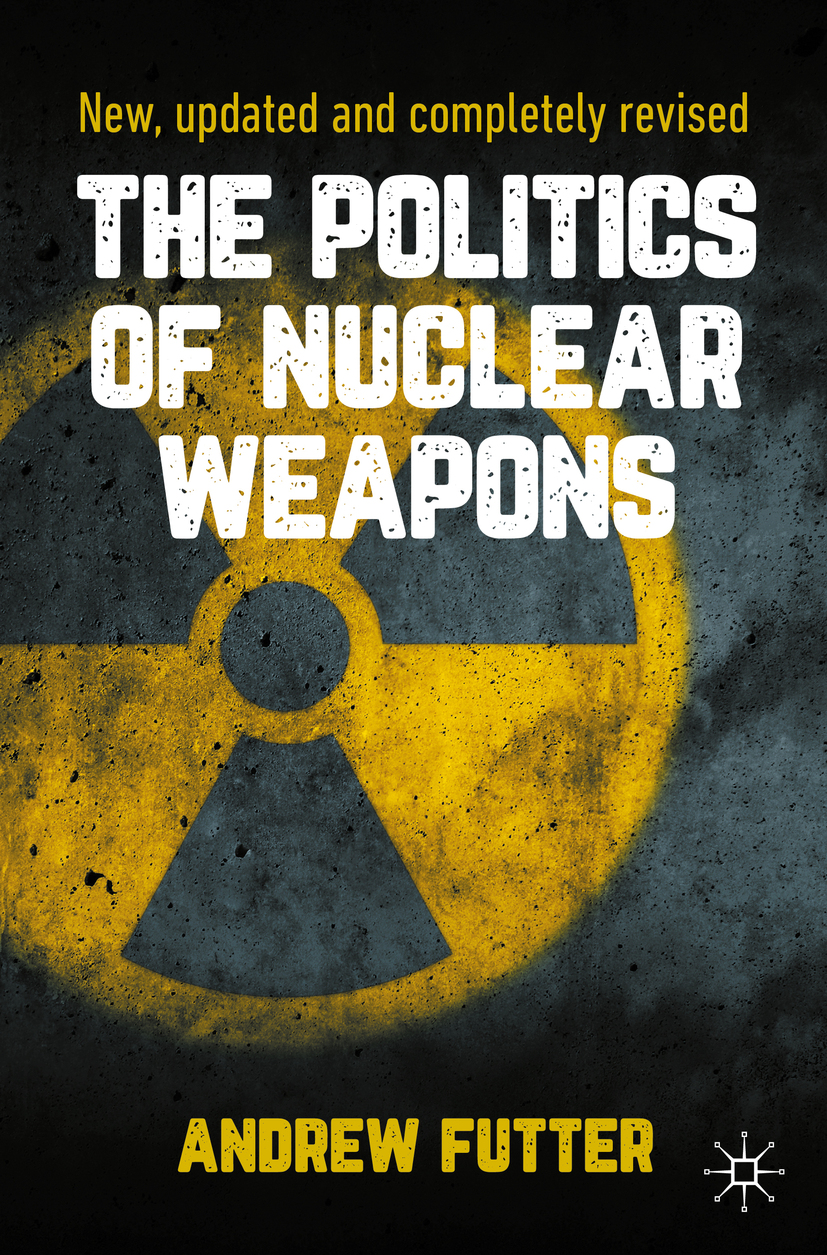Andrew Futter
The Politics of Nuclear Weapons
New, updated and completely revised
2nd ed. 2021

Logo of the publisher
Andrew Futter
School of History, Politics and International Relations, University of Leicester, Leicester, UK
ISBN 978-3-030-48736-2 e-ISBN 978-3-030-48737-9
https://doi.org/10.1007/978-3-030-48737-9
The Editor(s) (if applicable) and The Author(s), under exclusive license to Springer Nature Switzerland AG 2021
This work is subject to copyright. All rights are solely and exclusively licensed by the Publisher, whether the whole or part of the material is concerned, specifically the rights of translation, reprinting, reuse of illustrations, recitation, broadcasting, reproduction on microfilms or in any other physical way, and transmission or information storage and retrieval, electronic adaptation, computer software, or by similar or dissimilar methodology now known or hereafter developed.
The use of general descriptive names, registered names, trademarks, service marks, etc. in this publication does not imply, even in the absence of a specific statement, that such names are exempt from the relevant protective laws and regulations and therefore free for general use.
The publisher, the authors and the editors are safe to assume that the advice and information in this book are believed to be true and accurate at the date of publication. Neither the publisher nor the authors or the editors give a warranty, expressed or implied, with respect to the material contained herein or for any errors or omissions that may have been made. The publisher remains neutral with regard to jurisdictional claims in published maps and institutional affiliations.
Cover illustration: fewerton/shutterstock.com
This Palgrave Macmillan imprint is published by the registered company Springer Nature Switzerland AG.
The registered company address is: Gewerbestrasse 11, 6330 Cham, Switzerland
This book is dedicated to Betty Crofts
Praise for the First Edition
The Politics of Nuclear Weapons is a book that has it all: fascinating personalities, fundamental scientific discoveries explained with clarity, and the birth of political issues that are as relevant today as they were over seventy years ago. [It] is an excellent resource for students seeking a better understanding of the weapons that have dominated international security and strategy since 1945, and it is particularly suitable for advanced undergraduate and postgraduate students. it grapples effectively with a vast research literature and complex policy debates and provides a strong introduction to both the technological and strategic aspects of nuclear weaponry.
Margad-Erdene Olzbaatar, Comparative Strategy, November 1, 2017
The book offers a meaningful synthesis of a wide variety of facts and opinions on key issues concerning nuclear weapons. Succinctly yet accurately, Futter describes the early years of the development of nuclear weapons and nuclear strategies, discusses differences between vertical and horizontal proliferation , identifies the obstacles associated with managing nuclear proliferation and disarmament, and addresses the challenges related to the access of non-state actors to nuclear weapons.
Lubo Fendrych, Global Policy, August 13, 2015
Andrew Futter has written a superb textbook on the politics of nuclear weapons, covering both technical and political matters with original insight, expert commentary and thorough organization that makes this an excellent choice for undergraduate and graduate courses in international relations, foreign policy and military strategy.
Stephen Cimbala, Distinguished Professor of Political Science, Penn State Brandywine, USA
This timely book will provide students and academics alike with a valuable foundation for understanding nuclear weapons related issues in both historical and contemporary contexts. Andrew Futter guides the reader through the technologies, strategies and debates that have characterized the nuclear age from the Manhattan Project to present day concerns over the potential for nuclear terrorism and Irans continued nuclearization.
Wyn Bowen, Head of the School of Security Studies, Kings College London , UK
Preface to the Second Edition
When I wrote the first edition of this textbook back in 2014 (just before the crisis in Ukraine ), there was a feeling of optimism about global nuclear politics. Indeed, as I re-read many of the chapters for this second edition, I was struck not just by the changes in real world developments, mostly but not all for the worst, but particularly by the change in tone. Six years ago, we appeared to be on the cusp of a renewed wave of genuine interest in nuclear disarmament , arms control and nuclear security, and notwithstanding the agreement of the Nuclear Ban Treaty in 2017, and the fact that global nuclear stockpiles have reduced from approximately 16,300 in 2014 to 13,355 in October 2020, this appears to have dissipated. Instead, we have seen the US withdrawal from the Iran Nuclear Deal, the end of the Intermediate-Range Nuclear Forces Treaty, extensive commitments made to nuclear modernisation by all nuclear armed states, a fear of renewed arms racing and dangerous rhetoric, the emergence of new disruptive technologies, and feeling that both the structures of global nuclear governance and the entire nuclear arms control edifice is in trouble. While many of the old challenges remain, it is hard not to feel like our nuclear world is a more dangerous place than it was a decade ago. My feeling is that there is less focus on progressive moves toward disarmament and nuclear reductions today, and much more on managing a deteriorating global nuclear order.
I have continued to use this book for my third-year specialist undergraduate module at the University of Leicester, and I am delighted to hear from colleagues that the book is being used by many other universities too. It is through teaching as much as reading and researching this topic that one gets to learn and get a better feel for what is required to understand our nuclear world. I hope this is reflected in this new edition. While the structure of the book remains broadly the same, and I havent substantially changed the overarching focus of any of the chapters, I have made extensive revisions and additions to reflect developments over the past few years and also to better explain or include aspects of global nuclear politics that I was perhaps less familiar with before. For example, including a section on critical, legal and feminist approaches to nuclear issues seemed like an obvious omission from the first edition. I also went back and rethought the section on nuclear strategy, placing this in the context of the nuclear revolution . Likewise, I reorganised how the book dealt with incorporated thinking about nuclear ages. But perhaps the biggest thing that I wanted to do was to make sure the book wasnt too Western and US/UK-centric (which is an easy trap to fall into) and which I hope I have now done. However, in doing this, it also became clear that whether one likes it or not, the United States in particular plays an unparalleled role in global nuclear politics, especially in setting the tone and shaping norms. Either way, I hope the book is better and more useful for these additions and revisions.

